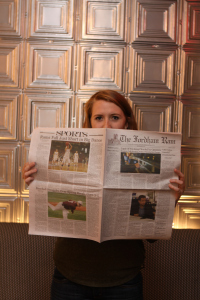For The Fordham Ram, we find ourselves concerned not only with what we print, but also with that which we cannot print. I am speaking here of those words and phrases which stain our language and tarnish our conversations, but manage to find themselves infiltrating the news cycle. Such obscenities find themselves in a newsworthy quote, or perhaps a keyword in an artistic subject both on our campus and beyond our gates.
When it comes to reporting stories that deal with profanities, formatting guides offer few alternatives for college newspapers. The Associated Press Stylebook, which The Fordham Ram consider its own, reads: “Do not use them in stories unless they are part of direct quotations and there is a compelling reason for them. Try to find a way to give the reader a sense of what was said without using the specific word or phrase.” Additionally, AP asks for a warning to be placed at the top of a story if an expletive is to follow. In the case that there is an obscenity included in a full quote, the obscenity must be replaced with hyphens, except for the first letter of the word.
This guide requires a college newspaper to cut a vital piece of information in a story. For example, if a student were to pronounce a graphic expression while committing a heinous crime on campus, the direct quote could not be printed without amendment. If a member of the community were to vocalize a charged utterance during a confrontation on campus, the direct quote could not be printed without amendment. While these are actions which are not common on campus, in the event that something similar does occur, there is a decision to be made by this newspaper.
Should The Fordham Ram reconsider its policy on this matter?
In this situation, it is essential to consider three concerns. The first is the precedence set by those media sources more distinguished and established than our own. The second is the audience for whom it is printed each week. The third is the character of the organization.
When considering the majority of news media today, most national and local newspapers follow AP Style. They are forced to make use of hyphens and asterisks rather than spelling out the whole word. Other American publications, including The New Yorker, have printed such profanities since the mid-1980s. The Guardian, Reuters and many British and Australian newspapers also lead the pack in printed profanities. The Economist, a British magazine, orders: “If you do use swear words, spell them out in full, without asterisks or other coynesses.”
One of the most reputable if not imitated newspapers in print today is The New York Times, which has been scrutinized for its tameness. Its style guide prohibits the use of obscenities, but states, “Readers should not be left uninformed or baffled about the nature of a significant controversy.” Yet, it is easy to make the case that readers often are baffled by The New York Times’ laughable tendency to pussyfoot around vital facts. Editors have no choice but to jump through hoops and evade the use of profanities as gracefully as possible.
The lack of consensus among such prestigious news sources only complicates the question. It points to the resistance of editors, who find the change too risky and, perhaps, the guideline too standard. The hesitance to change also represents a disagreement among readers, many of whom find obscenities unsuitable reading material on the train ride to work. Many readers also argue for the sake of family-friendly news, where print journalism remains widely accessible to as many people as possible.
As for our audience, The Fordham Ram not only serves students, but also administrators, professors, families and guests to the campus. This reality presents a choice for the newspaper moving forward. Some argue that people are exposed to all kinds of profanity online. An obscenity—be it racially charged or not meant for the ears of children—is just a click away once we log onto our computers. While the Internet can be a foul and dirty place, it is important to consider the voice speaking these profanities.
In “An Obscenity Symbol,” a commanding article which dances around the f-word Allen Readers writes: “Just as there is a stratum of words suitable for a baccalaureate address, another for a picnic party, and another for a chat with a kindergartener, so there is a stratum of despicable, obscene words that should be left to those who are graceless enough to use them.” For the author, “stratum” is everything. Comparing the Internet to a campus newspaper is a stretch, and hardly a proper consideration of the definitive purpose and audience of each.
Lastly, it is important to consider The Fordham Ram’s character. Having served the community since 1918, this organization’s awareness of free speech issues on campus remains in the forefront. Yet, there is a considerable distinction between voices on campus, and the campus voice. Community members may incorporate these words frequently but presenting ourselves as an esteemed community requires an emphasis on character, which starts with our campus organizations. Call me old-fashioned, but a few hyphens or a graceful pirouette around a not-so-graceful word will do, for the sake of readers and for the joke of our character.
Joseph Vitale, FCRH ’16, is an English major from Staten Island, N.Y.





